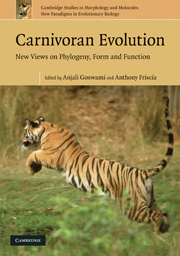Book contents
- Frontmatter
- Contents
- Contributors
- Preface
- Acknowledgements
- 1 Introduction to Carnivora
- 2 Phylogeny of the Carnivora and Carnivoramorpha, and the use of the fossil record to enhance understanding of evolutionary transformations
- 3 Phylogeny of the Viverridae and ‘Viverrid-like’ feliforms
- 4 Molecular and morphological evidence for Ailuridae and a review of its genera
- 5 The influence of character correlations on phylogenetic analyses: a case study of the carnivoran cranium
- 6 What's the difference? A multiphasic allometric analysis of fossil and living lions
- 7 Evolution in Carnivora: identifying a morphological bias
- 8 The biogeography of carnivore ecomorphology
- 9 Comparative ecomorphology and biogeography of Herpestidae and Viverridae (Carnivora) in Africa and Asia
- 10 Ecomorphological analysis of carnivore guilds in the Eocene through Miocene of Laurasia
- 11 Ecomorphology of North American Eocene carnivores: evidence for competition between Carnivorans and Creodonts
- 12 Morphometric analysis of cranial morphology in pinnipeds (Mammalia, Carnivora): convergence, ecology, ontogeny, and dimorphism
- 13 Tiptoeing through the trophics: geographic variation in carnivoran locomotor ecomorphology in relation to environment
- 14 Interpreting sabretooth cat (Carnivora; Felidae; Machairodontinae) postcranial morphology in light of scaling patterns in felids
- 15 Cranial mechanics of mammalian carnivores: recent advances using a finite element approach
- Index
- Plates
Preface
Published online by Cambridge University Press: 05 July 2014
- Frontmatter
- Contents
- Contributors
- Preface
- Acknowledgements
- 1 Introduction to Carnivora
- 2 Phylogeny of the Carnivora and Carnivoramorpha, and the use of the fossil record to enhance understanding of evolutionary transformations
- 3 Phylogeny of the Viverridae and ‘Viverrid-like’ feliforms
- 4 Molecular and morphological evidence for Ailuridae and a review of its genera
- 5 The influence of character correlations on phylogenetic analyses: a case study of the carnivoran cranium
- 6 What's the difference? A multiphasic allometric analysis of fossil and living lions
- 7 Evolution in Carnivora: identifying a morphological bias
- 8 The biogeography of carnivore ecomorphology
- 9 Comparative ecomorphology and biogeography of Herpestidae and Viverridae (Carnivora) in Africa and Asia
- 10 Ecomorphological analysis of carnivore guilds in the Eocene through Miocene of Laurasia
- 11 Ecomorphology of North American Eocene carnivores: evidence for competition between Carnivorans and Creodonts
- 12 Morphometric analysis of cranial morphology in pinnipeds (Mammalia, Carnivora): convergence, ecology, ontogeny, and dimorphism
- 13 Tiptoeing through the trophics: geographic variation in carnivoran locomotor ecomorphology in relation to environment
- 14 Interpreting sabretooth cat (Carnivora; Felidae; Machairodontinae) postcranial morphology in light of scaling patterns in felids
- 15 Cranial mechanics of mammalian carnivores: recent advances using a finite element approach
- Index
- Plates
Summary
With its high taxonomic, morphological, and ecological diversity and excellent fossil record, the placental mammal order Carnivora has proven to be a model group for addressing questions of large evolutionary significance. Recent work has resulted in a well-resolved phylogeny of extant taxa, as well as for many extinct clades, allowing for rigorous analysis of a wide range of evolutionary questions. Although the order is named after its meat-eating members, the dietary breadth of living carnivorans (members of the order Carnivora) extends from frugivorous to insectivorous taxa, durophagous taxa, as well as the hypercarnivorous taxa that are usually associated with the group. Carnivoran locomotor diversity is also remarkable among mammals, with fully aquatic, semi-aquatic, arboreal, terrestrial, and fossorial taxa. Recent studies have shown that this diversity extends to their early fossil representatives. Multiple ecological and morphological convergences of carnivorans and distantly related clades, including the extinct creodonts and extant and extinct carnivorous marsupials, also strengthen the utility of carnivorans for comparative ecomorphological and biomechanical studies. This volume focuses not only on the current advances in our understanding of mammalian carnivoran evolution, but especially on how carnivorans are being used as a model clade for testing new methodologies and addressing fundamental issues in palaeontology, which can ultimately be applied to clades with poorer fossil records.
The subtitle of this volume – ‘New Views on Phylogeny, Form, and Function’ – while being pleasantly alliterative, highlights some of the most exciting fields of study in evolutionary biology and palaeontology to which carnivorans have lent themselves. In recent years, mammalian carnivorans have been the focus of extensive phylogenetic analyses, both molecular and morphological, and incorporating both extant and fossil taxa, which have resolved many long-standing issues in carnivoran relationships. Flynn et al. (Chapter 2) provide an overview of the state of overall carnivoran phylogeny, erect a new clade, and demonstrate some of the patterns that can be studied using a phylogenetic framework.
- Type
- Chapter
- Information
- Carnivoran EvolutionNew Views on Phylogeny, Form and Function, pp. ix - xiPublisher: Cambridge University PressPrint publication year: 2010

